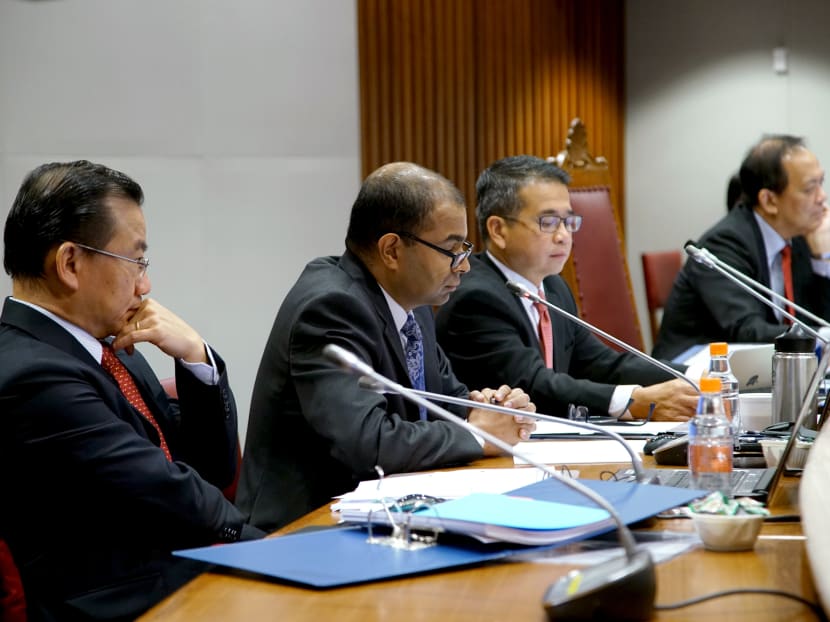Human Rights Watch drops out from attending public hearing on online falsehoods
SINGAPORE — Human Rights Watch, an international non-governmental organisation, decided not to take part in a hearing before a government committee studying how to tackle deliberate online falsehoods, and the Ministry of Law (MinLaw) said that the no-show was “disappointing, but not surprising”.

Close to 80 individuals and organisations were invited to give their views to the Select Committee on Deliberate Online Falsehoods, set up by the Government to study and report on online falsehoods. Photo: MCI
SINGAPORE — Human Rights Watch, an international non-governmental organisation, decided not to take part in a hearing before a government committee studying how to tackle deliberate online falsehoods, and the Ministry of Law (MinLaw) said that the no-show was “disappointing, but not surprising”.
The comments by the ministry came after two sets of witnesses gave evidence to the committee on Friday (March 23) and singled out the group, claiming that it has been putting up false information about the Singaporean authorities and of governments in other countries.
Close to 80 individuals and organisations were invited to give their views to the Select Committee on Deliberate Online Falsehoods, set up by the Government to study and report on online falsehoods. The ongoing public hearings at Parliament House are organised by MinLaw and the Ministry of Communication and Information,
On Friday, the committee’s chairman Charles Chong also issued a statement on the chronology of exchange with Human Rights Watch after it was invited on March 5 to give oral evidence.
The organisation agreed at first to send a representative, but later said that the person could not turn up at the agreed date due to “other travel plans that cannot be changed”. There were offers to reschedule the meeting, to fund their trip to Singapore, and to conduct the hearing through video-conferencing, but the group finally replied that it was unable to take part.
MinLaw said on Friday that “serious allegations” have been made to the committee against Human Rights Watch and its work. Questions have also been raised about how its board was appointed, the influence exerted by donors, the organisation’s links to the United States’ foreign policy establishment and its “untrue statements” in the report Kill the Chicken to Scare the Monkeys – Suppression of Free Expression and Assembly in Singapore.
Noting that Human Rights Watch has put itself out as an “independent, objective and transparent human rights organisation”, the ministry said that the group would have had the chance to “vindicate itself and set out its views” if it had appeared before the committee.
It chose not to do so, and MinLaw said that its initial willingness to appear before the committee evaporated once it was told that its representative should be prepared to answer questions about the report.
“Human Rights Watch’s stance is disappointing, but not surprising. It has a pattern of issuing biased and untruthful statements about Singapore. It knows that its report will not withstand any scrutiny, and has therefore chosen not to come to Singapore to publicly defend its views.... by its conduct, (it) has shown that it cannot be taken seriously as a commentator or interlocutor on issues relating to Singapore,” MinLaw added.
.embed-container { position: relative; padding-bottom: 56.25%; height: 0; overflow: hidden; max-width: 100%; } .embed-container iframe, .embed-container object, .embed-container embed { position: absolute; top: 0; left: 0; width: 100%; height: 100%; }‘SELECTIVE REPRESENTATION OF FACTS’
During the hearing on Friday, witnesses from the People’s Action Party (PAP) Policy Forum said that the report by Human Rights Watch was an example of how organisations can use technology to spread falsehoods. Their submission also looked at the organisation’s motivations and reasons for spreading these falsehoods.
The PAP Policy Forum is a platform for the ruling party’s rank-and-file members to engage government leaders on policy issues. In its submission, the four witnesses from the party’s wing said that the Human Rights Watch’s report showed how “selective presentation of facts can paint a very misleading picture” and is an example of suggesting falsehoods by suppressing the truth.
For instance, the report described the now-defunct website The Real Singapore (TRS) as an extremely popular website that was about citizen journalism, but “conveniently omits” to mention how the founders of TRS had deliberately fabricated sensational falsehoods directed against foreigners.
Likewise, another witness Gerald Steinberg, the president of NGO Monitor, also told the committee that Human Rights Watch made statements on facts without any basis. NGO Monitor is a non-governmental organisation that produces and distributes critical analysis and reports on the activities of the international and local NGO networks.
Professor Steinberg was asked by Member of Parliament Edwin Tong, who sits on the committee, about a report published by NGO Monitor in 2009 that looked at Human Rights Watch’s involvement in the Arab-Israeli conflict, including analysing the group’s source of funding and employees.
The professor noted that while the information was from a decade ago, he said that non-governmental organisations are an industry and receive money from governments and private philanthropy.
He said that Human Rights Watch was “more than typical” of other human rights organisations, and hired people who held “radical left-wing ideology”. Its founder Robert Bernstein wrote in an opinion piece in The New York Times denouncing the organisation for losing its moral compass.
Noting that Human Rights Watch has a “very specific set of political and ideological objectives, Prof Steinberg added: “I don’t think any organisation that relies on donations from people who are politically or ideologically identified and committed will do something that will be inconsistent with that ideology. So funding makes a difference.”






